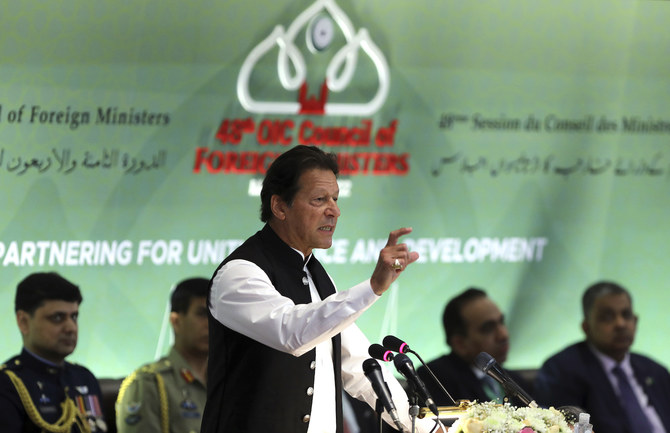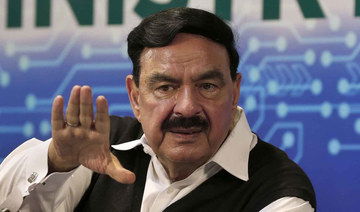ISLAMABAD: Pakistan Prime Minister Imran Khan on Tuesday urged member states of the Organization of Islamic Cooperation to mediate and help “bring about a ceasefire” between Russia and Ukraine.
More than 600 delegates from 56 OIC member states and observer countries are participating in the body’s 48th Council of Foreign Ministers session being held in Islamabad from March 22 to 23. The theme of this year’s conference is “Partnering for Unity, Justice, and Development.”
Though Russian troops have failed to capture any major Ukrainian city more than four weeks into their invasion, they are increasingly now resorting to causing massive destruction to residential areas using air strikes, long-range missiles and artillery.
“We, like everyone else in the world, are all worried about what’s happening there (in Ukraine),” Khan said. “May I suggest that the OIC, during its discussions, the foreign ministers, we should think how we represent 1.5 billion people, how we can mediate, how we can bring about a ceasefire, how can we bring about an end to the conflict.”
On Feb. 24, Russia launched a full-scale invasion of Ukraine, drawing widespread condemnation from countries around the world and triggering a wave of international sanctions against Moscow. Pakistan remains one of the few countries in the world that has refrained from condemning Russia directly, though it has called for the use of diplomacy to deescalate the crisis.
During Tuesday’s address, Khan said he would hold a meeting with Chinese Foreign Minister Wang Yi during the OIC summit to discuss how Beijing, together with the OIC, could help resolve the conflict.
“This conflict will have great consequences for the world,” he warned, adding that Pakistan was already suffering as oil, wheat and gas prices had shot up in the country in the wake of the Russian invasion.
Khan also spoke about a humanitarian crisis in Afghanistan.
Following the Taliban takeover of Afghanistan in mid-August last year, the aid-dependent country was cut off from billions of dollars in international assistance and financial institutions, while nearly $10 billion of its assets were frozen by the US, triggering a banking crisis.
Khan said Afghanistan was reeling from sanctions and called on the international community to engage with Afghans to save them from a humanitarian catastrophe.
Khan also said “we (OIC) have failed both the Palestinians and the people of Kashmir.”
“I am sad to say that we have been able to make no impact at all,” he said, adding that Muslim countries were “a divided house.”

In his opening remarks as chair of the conference, Pakistan Foreign Minister Shah Mahmood Qureshi warned about the “threat of genocide” faced by the Muslims of Indian-administered Kashmir.
“The threat of genocide is most imminent,” he said.
Kashmiri territory has long been a flashpoint between India and Pakistan. Both claim all of the region but rule only in part.
Qureshi said the government of Indian Prime Minister Narendra Modi had “unleashed a reign of terror” since August 2019 when it withdrew Kashmir’s autonomy in order to tighten the central government’s grip over the region, provoking outrage in Pakistan and the downgrading of diplomatic ties and suspension of bilateral trade.
He called on the OIC member states to partner with the international community and take “concrete and tangible” steps for the resolution of the conflicts in Kashmir, as well as Palestine.

After Qureshi’s speech, Saudi Foreign Minister Prince Faisal bin Farhan delivered his opening statement, announcing “support to the people of Jammu and Kashmir.”
“We also support the efforts made by the international community to reach a just solution for the Jammu and Kashmir issue,” he said.
Prince Faisal also condemned the aggression of the Houthi rebels in Yemen and called on Muslim nations to apply more pressure on the group.
“In line (with) international resolutions, Saudi Arabia calls (for measures) to neutralize (the) Houthi groups and wants to stop the importing of arms in Yemen,” he said. “We reiterate the importance of the role of brothers to (apply) more pressure on (the) Houthis so that they can be stopped from jeopardizing the security of the Kingdom.”













